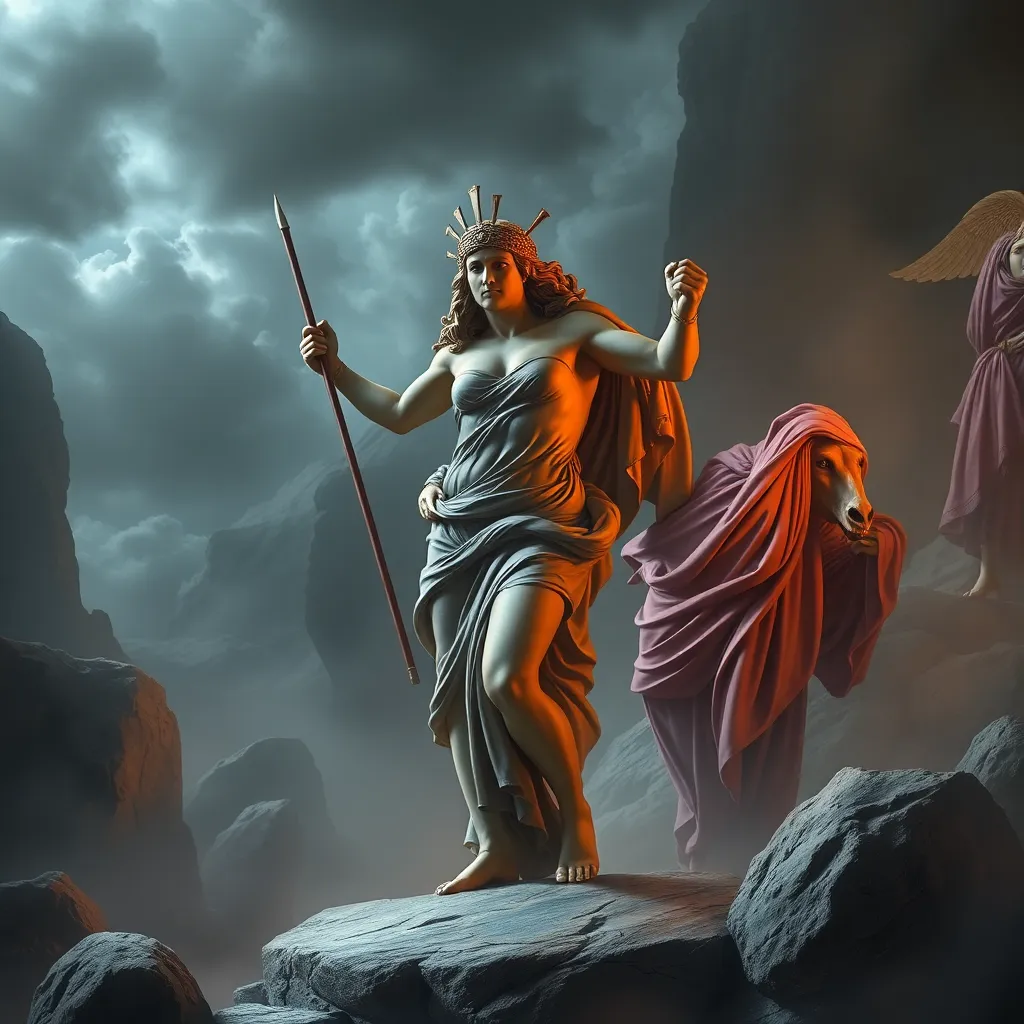Hera’s Influence on Greek Tragedy: Themes of Power and Betrayal
Introduction
In the rich tapestry of Greek mythology, Hera stands as a formidable figure, known as the Queen of the Gods and the goddess of marriage and family. Her character embodies the complexities of power dynamics and emotional turmoil, making her a significant influence in the realm of Greek tragedy. Greek tragedy often delves into the darker aspects of human experience, exploring themes such as fate, revenge, and the moral ambiguities of power. This article argues that Hera’s character exemplifies the intertwining themes of power and betrayal, deeply influencing the narratives of various Greek tragedies.
Hera: The Queen of the Gods
Hera is primarily recognized for her majestic attributes and symbolism as the goddess of marriage, women, and childbirth. Often depicted wearing a crown and holding a scepter, she embodies authority and regality. Her relationships with other gods and mortals are complex, characterized by both love and rivalry. She is married to Zeus, the king of the gods, yet their union is fraught with tension due to Zeus’s infidelities.
The duality of Hera’s power is evident in her roles as both a protector of women and a vengeful deity. On one hand, she safeguards the sanctity of marriage, while on the other, she mercilessly punishes those who threaten her authority or betray her trust. This duality plays a pivotal role in shaping the narratives within Greek tragedies.
Thematic Exploration of Power in Greek Tragedy
Power in the context of Greek tragedy is often portrayed as a double-edged sword, capable of both elevating and destroying individuals. Hera’s influence is palpable in how authority and control are depicted throughout various tragedies. Her desire for power often leads to conflicts that drive the plots of these works.
- In Aeschylus’s “The Suppliants,” Hera’s protective nature is evident as she champions the cause of the oppressed, highlighting her role as a goddess of justice.
- Euripides’s “Hecuba” reveals Hera’s power in the realm of revenge, as her wrath against the Trojans demonstrates the destructive aspects of authority.
- In Sophocles’s “Oedipus Rex,” the tragic hero’s downfall is partly influenced by the divine power struggles, showcasing how Hera’s character casts a long shadow over the narrative.
Betrayal as a Central Theme
Betrayal is a recurring theme in the context of Hera’s relationships, particularly with Zeus. Her experiences of betrayal not only shape her character but also influence the tragic narratives within Greek drama. Hera’s responses to these betrayals often lead to catastrophic consequences for both mortals and gods alike.
For instance, in Aeschylus’s “Agamemnon,” Hera’s betrayal by Zeus leads her to take vengeance on the Trojans, showcasing how her sense of betrayal fuels the tragic cycle of revenge. Similarly, in Euripides’s “The Women of Troy,” Hera’s anger over being wronged manifests in the suffering of innocent characters, emphasizing the collateral damage of betrayal.
Hera’s Influence on Tragic Heroes and Heroines
The characters affected by Hera’s decisions and actions often grapple with moral dilemmas that highlight the complexities of power dynamics. Tragic figures such as Agamemnon and Orestes find themselves ensnared in conflicts that stem from Hera’s influence, leading to devastating outcomes.
- Agamemnon’s sacrifice of his daughter Iphigenia is heavily influenced by Hera’s desire for revenge against Troy, showcasing the tragic consequences of divine power.
- Orestes’s quest for vengeance against his mother Clytemnestra, spurred by Hera’s influence, raises questions about justice and morality.
This interplay between Hera’s actions and the tragic heroes’ moral dilemmas underscores the significant impact of divine power on character development within Greek tragedy.
Symbolism of the Peacock and Other Motifs
The peacock stands as a powerful symbol of Hera’s pride and authority. Often depicted with iridescent feathers, the peacock represents beauty and power, but it also embodies vanity and jealousy—themes that resonate deeply within Greek tragedies.
Other recurring motifs associated with Hera include:
- The cow, symbolizing nurturing and motherhood, reflecting her role as the protector of women.
- The pomegranate, signifying fertility and marriage, enhancing her identity as the goddess of family.
These symbols enrich the exploration of themes related to power and betrayal, allowing audiences to engage with the complexities of Hera’s character and her influence on human affairs.
Comparative Analysis with Other Greek Deities
When contrasting Hera with other goddesses such as Athena and Artemis, distinct differences and similarities in the portrayal of power and betrayal emerge. Athena, known for her wisdom and strategic warfare, often represents a more rational use of power, while Hera’s actions are frequently driven by emotional turmoil and vengeance.
In contrast, Artemis embodies the independence and strength of female power, yet her narratives do not delve as deeply into the themes of betrayal that characterize Hera’s storylines. This comparative analysis highlights the unique role Hera plays in shaping human fate through divine influence, particularly in tragic contexts.
Conclusion
Hera’s impact on Greek tragedy is profound, as her character embodies the intricate themes of power and betrayal. Through her relationships and the consequences of her actions, Hera shapes the narratives of tragic heroes and heroines, revealing the moral complexities of authority. These themes remain relevant in contemporary interpretations of Greek tragedy, allowing audiences to reflect on the nature of power and its capacity for destruction and betrayal.
Ultimately, Hera’s legacy endures in literature and the arts, serving as a timeless reminder of the intricate interplay between divine influence and human experience.




